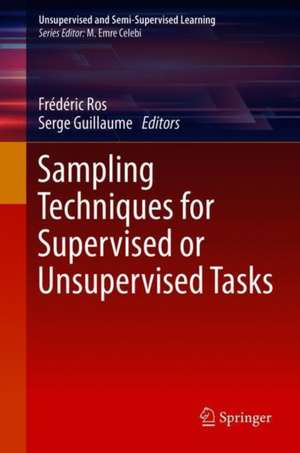Sampling Techniques for Supervised or Unsupervised Tasks: Unsupervised and Semi-Supervised Learning
Editat de Frédéric Ros, Serge Guillaumeen Limba Engleză Hardback – 21 noi 2019
- Provides a comprehensive description of sampling techniques for unsupervised and supervised tasks;
- Describe implementationand evaluation of algorithms that simultaneously manage scalable problems and curse of dimensionality;
- Addresses the role of sampling in dynamic scenarios, sampling when dealing with complex objects, and new challenges arising from big data.
M. Emre Celebi, Ph.D., Professor and Chair, Department of Computer Science, University of Central Arkansas
"In science the difficulty is not to have ideas, but it is to make them work"
From Carlo Rovelli
From Carlo Rovelli
| Toate formatele și edițiile | Preț | Express |
|---|---|---|
| Paperback (1) | 724.50 lei 6-8 săpt. | |
| Springer International Publishing – 21 noi 2020 | 724.50 lei 6-8 săpt. | |
| Hardback (1) | 730.47 lei 6-8 săpt. | |
| Springer International Publishing – 21 noi 2019 | 730.47 lei 6-8 săpt. |
Preț: 730.47 lei
Preț vechi: 890.82 lei
-18% Nou
Puncte Express: 1096
Preț estimativ în valută:
139.78€ • 149.47$ • 116.54£
139.78€ • 149.47$ • 116.54£
Carte tipărită la comandă
Livrare economică 18 aprilie-02 mai
Preluare comenzi: 021 569.72.76
Specificații
ISBN-13: 9783030293482
ISBN-10: 3030293483
Pagini: 232
Ilustrații: XIII, 232 p. 40 illus., 30 illus. in color.
Dimensiuni: 155 x 235 mm
Greutate: 0.53 kg
Ediția:1st ed. 2020
Editura: Springer International Publishing
Colecția Springer
Seria Unsupervised and Semi-Supervised Learning
Locul publicării:Cham, Switzerland
ISBN-10: 3030293483
Pagini: 232
Ilustrații: XIII, 232 p. 40 illus., 30 illus. in color.
Dimensiuni: 155 x 235 mm
Greutate: 0.53 kg
Ediția:1st ed. 2020
Editura: Springer International Publishing
Colecția Springer
Seria Unsupervised and Semi-Supervised Learning
Locul publicării:Cham, Switzerland
Cuprins
Introduction to sampling techniques.- Core-sets: an Updated Survey.- A family of unsupervised sampling algorithms.- From supervised instance and feature selection algorithms to dual selection: A Review.- Approximating Spectral Clustering via Sampling: A Review.- Sampling technique for complex data.- Boosting the Exploration of Huge Dynamic Graphs.
Notă biografică
Frédéric Ros has an engineering degree in Microelectronics and Automation, a Master in Robotics from Montpellier University and a Ph.D. from ENGREF (Ecole Nationale du Genie Rural des Eaux et Forets),Paris. He began his career in 1991 as a research scientist working in the field of image analysis for robotics and artificial systems from IRSTEA. He managed the vision activity in GEMALTO for 14 years, which is the world leader in the smart card industry. He was particularly involved in applied developments (related to machine vision, AI, data analysis, fuzzy logic and supervised classification algorithms) with the aim of providing adaptive and self-tuning systems corresponding to the growing complexity of industrial processes and especially multi-disciplinary interactions. As a Professor at Orleans University, he has been an associate researcher at PRISME laboratory (signal an image processing) for ten years, focusing his research on machine learning algorithms in the big data context. In parallel, he has head an innovation park for 11 years and recently designed and structured a digital start up incubator.
Serge Guillaume got his PhD in Computer Science in 2001 and his habilitation thesis (HDR) in 2005, both from Toulouse University. He has been working for IRSTEA, a public National Research Institute of Science and Technology for Environment and Agriculture, for 30 years. He has been involved in fuzzy systems design and optimization for 20 years. He is now also interested in the design of decision support systems based on spatial data, and this includes spatial modeling, e.g. zone delineation, and multicriteria decision making. His work is implemented as two open source softwares, FisPro and GeoFIS.
Serge Guillaume got his PhD in Computer Science in 2001 and his habilitation thesis (HDR) in 2005, both from Toulouse University. He has been working for IRSTEA, a public National Research Institute of Science and Technology for Environment and Agriculture, for 30 years. He has been involved in fuzzy systems design and optimization for 20 years. He is now also interested in the design of decision support systems based on spatial data, and this includes spatial modeling, e.g. zone delineation, and multicriteria decision making. His work is implemented as two open source softwares, FisPro and GeoFIS.
Textul de pe ultima copertă
This book describes in detail sampling techniques that can be used for unsupervised and supervised cases, with a focus on sampling techniques for machine learning algorithms. It covers theory and models of sampling methods for managing scalability and the “curse of dimensionality”, their implementations, evaluations, and applications. A large part of the book is dedicated to database comprising standard feature vectors, and a special section is reserved to the handling of more complex objects and dynamic scenarios. The book is ideal for anyone teaching or learning pattern recognition and interesting teaching or learning pattern recognition and is interested in the big data challenge. It provides an accessible introduction to the field and discusses the state of the art concerning sampling techniques for supervised and unsupervised task.
M. Emre Celebi, Ph.D., Professor and Chair, Department of Computer Science, University of Central Arkansas
- Provides a comprehensive description of sampling techniques for unsupervised and supervised tasks;
- Describe implementationand evaluation of algorithms that simultaneously manage scalable problems and curse of dimensionality;
- Addresses the role of sampling in dynamic scenarios, sampling when dealing with complex objects, and new challenges arising from big data.
M. Emre Celebi, Ph.D., Professor and Chair, Department of Computer Science, University of Central Arkansas
"In science the difficulty is not to have ideas, but it is to make them work"
From Carlo Rovelli
Caracteristici
Provides a comprehensive description of sampling techniques for unsupervised and supervised tasks Describe implementation and evaluation of algorithms that simultaneously manage scalable problems and curse of dimensionality Addresses the role of sampling in dynamic scenarios, sampling when dealing with complex objects, and new challenges arising from big data













